Anatomy of an Era: Bill Doleman, Part 1
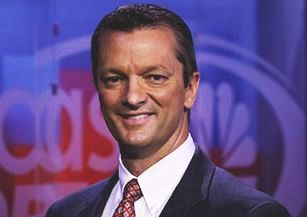
Excerpted from Chapter 101, No Place Like Nebraska: Anatomy of an Era, Vol. 2 by Paul Koch
“It was a terrible year, and it was a great year,” Osborne said.” I take my spiritual life pretty seriously, and there were some times when I was running on empty. Very frankly, I relied on my faith more than I ever have this year. I would not be honest if I didn’t say that.”
-Tom Osborne, as quoted by Malcolm Moran, Osborne Savors Acclaim After Troubled Season, New York Times, January 4, 1996
Former Nebraskan Gladys R. (Henry) Dick (1881-1963) was born in Pawnee City and earned her Bachelor of Science in Lincoln in the year 1900, just when the great Walter C.”Bummy” Booth coaching era began (Nebraska’s second best all-time .845 winning percentage over 6 seasons). Later serving as a physician in the Children’s Memorial Hospital of Chicago, she contracted what came to be known as Scarlet Fever. Teaming up with husband Dr. George Dick, they eventually isolated the cause of the disease and patented the production methods for the vaccine, earning a Nobel Prize nomination in the process.
What does this have to do with the great 60 & 3 era? Well, it wasn’t in a hospital setting nor the city of Chicago, but another Nebraskan contracted a slightly less fatal strain of the Scarlet Fever a full half century later. The boy’s name was William ‘Bill’ Doleman, and the outbreak in question happened to occur in Fairbury via exposure to a few live appearances, as well as television, radio, and print media.
Young Bill, sadly enough, never found the cure for this pervasive illness, this ruthless scourge, all but forcing him to assume a lifelong battle with the malady by partaking in a steady dose of dreams, leaps of faith, microphones and TV cameras. Lucky for him, the cure was no worse than the disease, and he’s presently sporting a clean bill of health despite it all.
Here’s Bill Doleman, a man still living the dream while co-existing with that ‘beautiful sickness’ known as Nebraska Football.
Notable quote #1:
“The players had a ‘players only’ meeting in the locker room. I remember seeing players file in, and it was quiet. I remember the door being held open by one of the captains and it was pretty clear that this was serious. And the door shut… I remember Christian’s voice saying, “What went down was horrible and all that, but this team is not going to be divided. It is not going to miss a beat. And we’re going to stick together.” I remember distinctly, though, him yelling, and it was loud. I remember hearing through that door, “We are not going to bring that man down!””
Bill Doleman
Question: Hey Bill, you grew up in Fairbury, Nebraska. Is that right?
Bill Doleman: Yeah.
Q: I thought so. Funny, but whenever I hear the words “Fairbury brand hot dogs’ I think of you. (laughs)
BD: That’s us. That what we’ve been known for. (laughs)
Q: Now if I recall, you were a broadcasting major, right?
BD: I was a broadcasting major, yep. I graduated by the time the teams of the ’90’s era rolled around.
Q: You worked at the Nebraska Sports Information Department, too?
BD: Yeah, I worked at Sports Info my sophomore year of college on until about ’91, ’92. So it was the fall of ’85 to the probably the fall of ’91. They let me stick around as kind of an Intern/Graduate Assistant after I graduated, so it kind of helped me in my career a little bit.
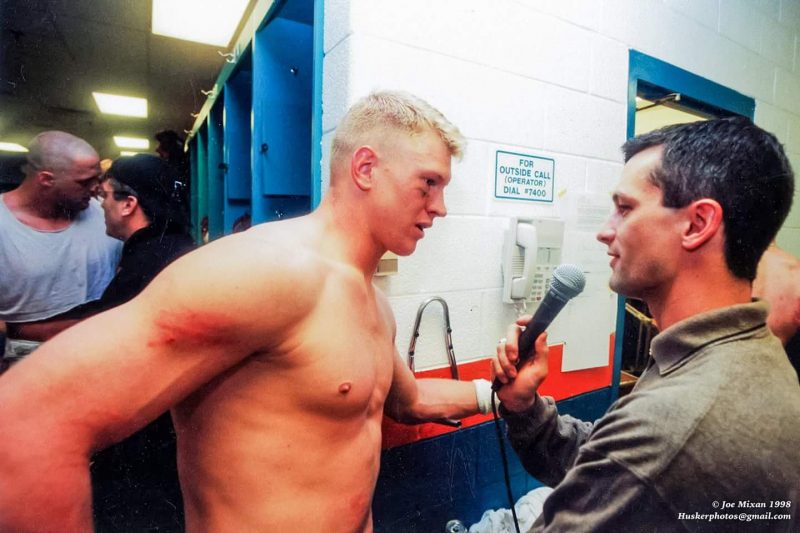
Q: What was it like to be a student assistant in the Nebraska Sports Information Department? And how did you come to witness that era?
BD: What’s really strange is –to make a short story long- my mom bought me a Nebraska Football Media Guide on one of our trips to Lincoln, probably back in about 1978 or so…
Q: Those smaller booklets with the rounded corners?
BD: That’s right. Yeah, that’s right. And I remember getting that guide and I remember –like every other Nebraska Fan with the media guide- I remember poring through it.
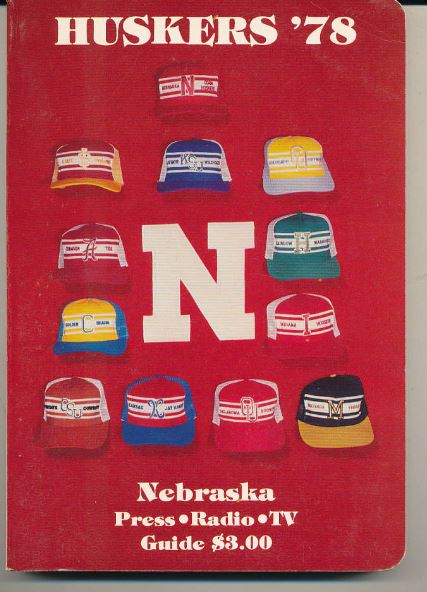
And I read Don Bryant’s bio. I’m twelve years old at the time and I remember thinking, ‘That would be a really cool job.’ I had no idea what it was, I didn’t know anything about it, but I just knew that that sounded pretty interesting at twelve years of age. So I got into journalism in high school and even further into it in college.
And the reason I went to Nebraska -and there are several reasons- but if you’re a small-town kid growing up in Nebraska and you have the opportunity to go to Nebraska football games on a weekly basis, it’s a pretty attractive deal. The school was affordable, the school was good -I’m not gonna downplay any of that- but the opportunity to go to Memorial Stadium for a Nebraska football game every week was great.
My sophomore year I actually got a job in the Sports Information Office. Don Bryant hired me, and now all of a sudden I’m working inside a place that I had held so dear growing up as a kid: for the Nebraska Athletic Department and working in some small way with the football program at Nebraska. It was the greatest job possible for a guy like me and was an unbelievable experience.
And I tell you one thing it really taught me, though (as somebody who grew up as a very rabid fan who lived and died with wins and losses), it really taught me what the real purpose of college athletics, especially what the mission of Nebraska Athletics, was all about. Tom Osborne’s book “More Than Winning” sounds cliché back home, but that’s really what you learned. And I became a much different fan having worked there prior to the one I was before working there. I really began to appreciate the athletes, the coaches, and what they were trying to do there as opposed to just winning the football games, the gymnastic meets, the wrestling matches and things like that. So, for me, it really put things into perspective.
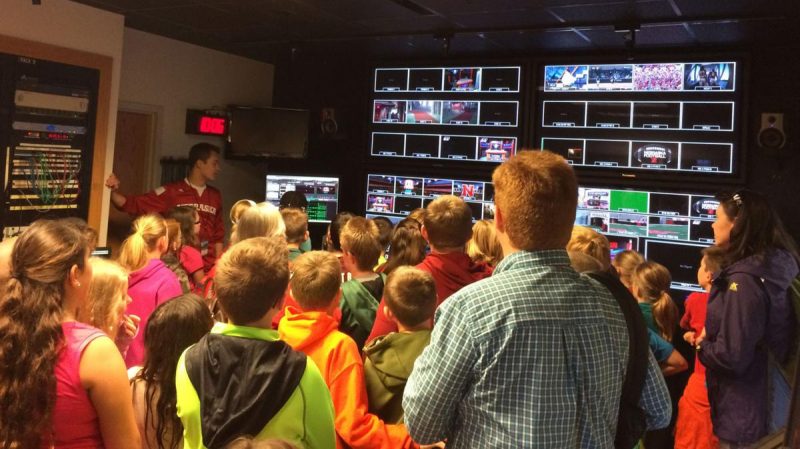
Q: How did Don Bryant end up hiring you? How did you get onto his radar in the first place?
BD: Well, I lived in a fraternity and I was sub-letting an apartment from a fraternity brother who had gone to Alabama for an internship. And the internship didn’t work out, so he showed up at the apartment and the next day we went looking for jobs. He was in the News Ed Department at the Journalism College and he saw on the bulletin board there an opening in the Nebraska Athletic Department’s Sports Information Department for a sports assistant. And he knew I wanted to work there, so he told me.
And I bugged them all summer long: I sent them my clippings from high school and called all the time. It was a summer-long deal before they finally said, “Why don’t you just come in and talk to Don Bryant.” (laughs) I remember clipping on a tie and going into his office, and he talked to me about Fairbury and about writing for the newspaper, talked about a lot of things, and I just kind of sat there and listened to him. And at the end of the deal he asked me if I could type and if I could write. I said, ‘Well, yeah. I think so.’ And he said, “Alright then, we’ll give you a shot and keep you around for three or four years.” ‘A shot? A shot?!’ It was one of those deals where you were, ‘Do I have the job?!’ (incredulous) Working for him and all the people in Sports Info was one of the great blessings of my life.
Q: And when you joined on, who was head of Sports Info?
BD: Well, Don was still the Sports Information Director and Tom Simons worked in the office and Chuck Pool worked in the office, and it wasn’t long after that Chuck left and Chris Anderson came on board, and Vicki Cartwright. I say that Don was in charge of the office, but that Vicki ran it. (laughing) And there were a couple of the student assistants there with me, and we were a tight little group and they gave us a lot of responsibility.
I would not be where I am today as a broadcaster had I not worked in the Nebraska Sports Info Department Office. It was the perfect training ground for learning how to prepare and learning to really appreciate what the athletes do, what the coaches are trying to do. If I broadcasted a volleyball match or a wrestling match or football games, whatever it might be, I never ever looked down on any assignment because of what I learned at Nebraska in terms of how important those athletes are and the amount of work they put in. Had I not been there it’s probably not a lesson I would have learned.
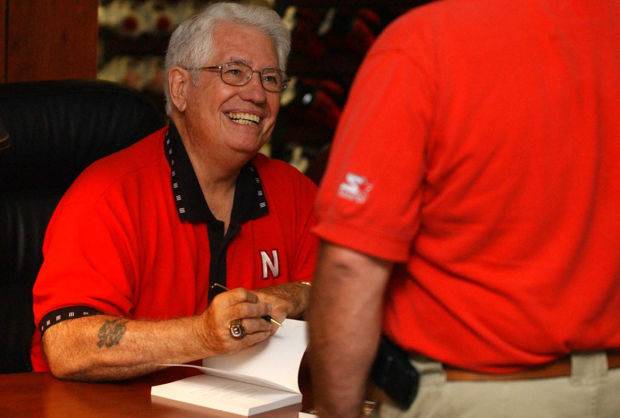
Don Bryant
Q: So when you’re broadcasting or highlighting a game -whether it’s overt or not- there is an extreme reverence for what the athletes have done to be out there?
BD: Absolutely.
Q: Were you originally thinking of broadcast or print journalism?
BD: Well, I was a journalism major for a day and then became a broadcasting major, but my goal the whole time was to be in Sports Information and maybe get into athletic administration at some point.
Q: I recall you were doing some stuff for NETV after a while, right?
BD: Yes, my first opportunity was a baseball game on April 9th, 1989, just prior to my graduating college. And I had no intentions of going into broadcasting, but the opportunity presented itself and I figured, ‘Well, I might as well give this a shot and see what this is all about.’ I did it and stumbled my way through it, and the next thing was a soccer match and then a football game.
My niche going in early on was volleyball, and ETV caught that wave with Nebraska Volleyball just as it was starting to go on this meteoric rise as one of the great programs of all time. Nebraska ETV right about 1988 did a couple of matches that were really exciting. One was an epic five-game match against Texas that I think was about 4 hours long. But I did some volleyball and knew the sport and had worked in Sports Information, and when I got the opportunity to call it I did a pretty good job. And that was right when Nebraska ETV and Nebraska Volleyball kind of got married along the way. I was fortunate to be on the wave, too.
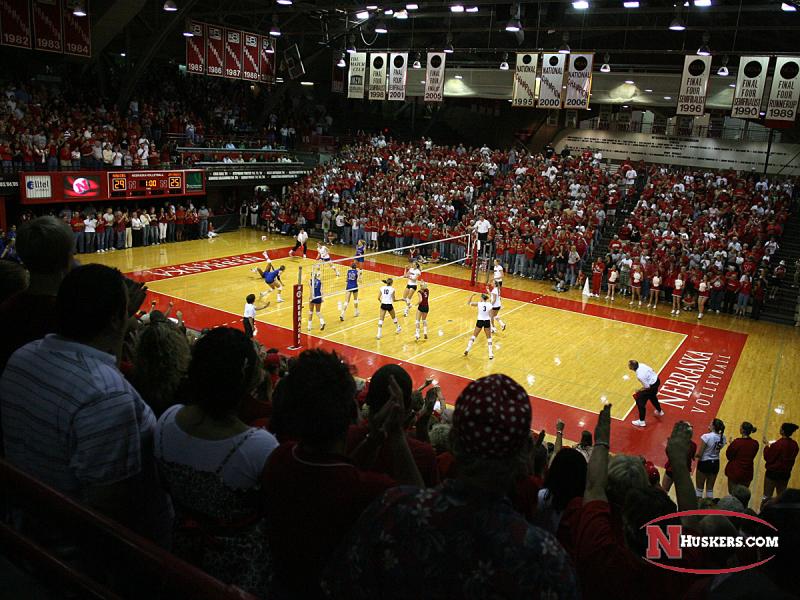
Q: I recall you did a few other gigs her and there, and all of a sudden you were doing the Tom Osborne Show…
BD: Yeah, I was cruising along making about fourteen grand a year. So to say I was a success out of the gate would not be accurate. (laughs) I was trying to piecemeal a freelance career together and I had no idea how to do it. Nobody had ever done it before being a freelance play-by-play guy and it was just kind of unknown territory for anybody in that area. It was tough. You have stars in your eyes and then you realize pretty quickly that it’s a rough go and you’ve got to catch a break here and there. I caught a couple of breaks but never really a big break.
And I became a Christian on December 20th of 1992, so my life had changed pretty dramatically, growing in my faith. I remember, I was going to St. Marks United Methodist church, which happened to be the same church Coach Osborne went to (not because of Coach Osborne), (laughs) but I went there because it was close to my apartment. But the fact that Coach Osborne went there -and we knew each other a little bit- it was great to see him in church on Sundays and understand who he was as a coach and how he was portrayed in the media. And the same guy you saw at work was the same guy you saw at church on Sundays. That was a great thing to see, that he was completely real and genuine, and to see him that way in a Christian setting at church was terrific for a young Christian like me.
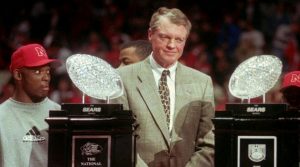
Well, it must have been the spring or summer of 1994 and I spoke at church one day and I gave my testimony about my faith. And Coach Osborne happened to be there in church that day; and I gave my testimony and I talked about the highs and the lows and the experience I was going through as a young broadcaster and as a young Christian and things like that. And he sent me a letter shortly thereafter and appreciated my willingness to share my story, and that really meant a lot to me. And it said, “If there’s anything I can do for you, let me know.” And it wasn’t too long after that I got a phone call at 7:30 one morning from… I believe it was Mary Lyn (Wininger), his secretary… or it could have been Tom, I don’t know.
Q: It was 7:30 in the morning?
BD: It was 7:30 in the morning and I was still in bed and I was awakened by the phone call. And the message was, “We’re having a meeting in Coach Osborne’s office at 8 o’clock. Could you be there?” I’m usually rolling over for the first time at 7:30, and I said, ‘Absolutely!’
And this was Divine intervention -I swear God made time stand still- because not only did I take a shower, drive the six miles down Vine Street and find a parking spot, but got to the office and made that 8 o’clock meeting! (laughs) It was totally the hand of God.
Q: Just finding a campus parking spot would have qualified for that, Bill!
BD: Yeah, you’re right! Just finding the parking spot was amazing! (laughs) It was the opportunity: they were going to do some stuff with HuskerVision (which just started up in the last year) and do more with his TV shows, and they wanted to know if I was interested. I’d be hosting the Tom Osborne Kickoff show, which was the pregame show on Saturday mornings, and help out with the Osborne Show. I wasn’t going to be doing the postgame show, but absolutely, that was a great opportunity at the time.
I was broadcasting on the HuskerVision team for ’94, did the pregame show, and then was writing the highlight videos and helped with the Osborne Show, and the next year in ’95 I took over for the Osborne Show. I think that was ’95, ’96 in there.
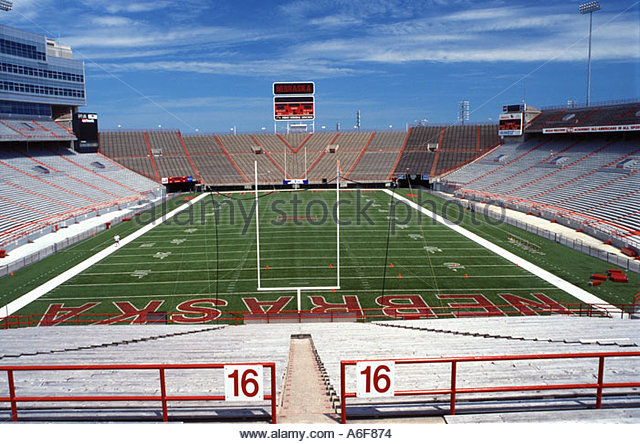
Q: Was Tom on the pregame show, too?
BD: Yeah, we taped that earlier, usually Thursday of that week. I think he would do something for us on that show where we’d scout the opponent. It was giving Nebraska football fans a little bit more Nebraska Football and they were eating it up. It was a good idea.
Q: Let’s say it’s a typical Saturday and you’re right in the middle of all that. Thursday you had the pregame show and then Saturday night, right after the game, you’re taping the Tom Osborne show for airing on Sunday night, right?
BD: Yeah, what we would do: if it was a home game, if it was a one o’clock game we might start taping around 6 or 7 p.m., maybe a little bit later than that. They would take the game tapes and edit them down and I would write the show. And Coach Osborne would hang around or maybe go home and then come back. Home Saturdays were pretty long days. Night games were even rougher -though they were the most fun- and what I would do is go up and I always sat on the outside perch on the very top of the press box. It didn’t matter if it was rain or sunshine or cold, I loved being out there, because I could hear the crowd and see the whole stadium. To me that was as close to heaven as you were going to possibly get.
And I would write down every single play, what happened every play, and then I’d pick out the plays that went into the show and the HuskerVision crew would edit the highlights after that. And our goal for taping the sixty-minute show was to have Tom in there for no longer than sixty-five minutes. We’d start taping and it was, ‘Let’s roll. Let’s get done.’ It was very rare that we had him in that chair more than sixty-five minutes. And then the tape got polished and somebody would drive it to the bus to go to North Platte or drive it up to Omaha and drop if off on Sunday morning.

Available on Amazon.com
If it was a road game I’d do the same thing: script out every play and fax that back to the HuskerVision studio. And since those games were on TV about every Saturday, those guys would cut the highlights from the TV broadcast, and then I would write the script on the plane and we would land and go directly to the stadium and start taping the show. Usually within an hour after we would land -and sometimes that was 2 or 3 o’clock in the morning- we taped.
After the Arizona State loss in 1996, I think, we started taping that show at about five o’clock in the morning. (And I remember driving home as the sun was coming up.) But then what those guys would do, we would do the show looking at the highlights from the TV broadcast, but then the HuskerVision editors would go in and lay the HuskerVision video over the show. So they would edit it again and then get it up to Omaha.
It was a very laborious process, but everybody who was affiliated that show -whether it was me as the host or Jeff Schmall as the Executive Producer or Kirk Hartman as the Director or Shot Kleen as the Engineer or the numerous students who worked on the show- I think everybody loved it because they loved Nebraska football, but they also knew they were doing something for the Nebraska football fans and for someone like Tom Osborne, because he treated everybody with the utmost respect.
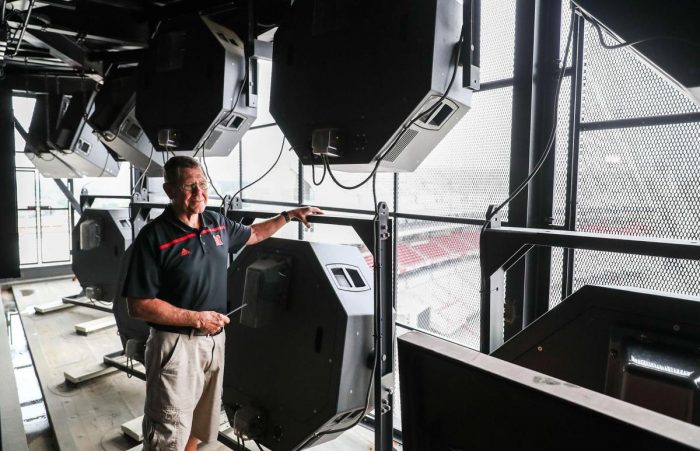
It was always the main thing, that if you worked hard for Tom he was always appreciative and he was always very generous. As generous as he was with his kind words (and maybe even a couple extra bucks out of his pockets), people really sold out to do the best job that they possibly could on that show because they felt it was important. It was a really neat thing. He would ask, “What does everybody do on this show?” And then he would bonus people at the end of the year. And it could be the people who had managerial positions or it could be a college student who was cutting highlights or somebody who was getting up at 2 o’clock in the morning to get it to a bus station or drive it up to Omaha. And if you were a college kid who grew up in Nebraska and were affiliated with the program and were getting a few extra bucks from Coach Osborne -a couple hundred bucks here and there as a bonus?- that’s a significant thing.
Q: It was like holding the nuclear football and following the President around Washington, DC… handling that final version of the T.O. Show’s tape?
BD: Yeah! He was so generous and so good to us that it didn’t matter if you were working into the wee hours. That’s just the kind of guy he was and he is.
Q: Obviously you had a lot of interaction with Tom. Any fond recollections off-camera that stay with you to this day?
BD: There are some things that stick with me. Being a kid from Fairbury, Nebraska, I grew up idolizing Nebraska football and having a great reverence for Tom Osborne, and to be in the position I was in ’94, ’95, ’96 and ’97, to host the Tom Osborne Show and to work fairly closely with him and I believe to be able to consider him as a friend? As a Nebraska kid it doesn’t get any better than that.
And to realize, Paul, that he was and is the real deal… he is genuinely a man of high character and integrity. And to understand what that program was really all about, when he’d say, “More than winning,” it was so true. I am a much different sports fan because I worked for Tom Osborne, and I’m a much better man because I worked for Tom Osborne.
<!– –>
–>
Embed from Getty Images
I’d always get a kick out of doing the show, when people were very complimentary, “You had a great show. Great job! Tom seemed much looser and you really brought out his sense of humor.” I was never really quite sure how to react to that, because… (laughs) because Tom’s ‘Tom.’ And if he was a little looser and funnier when I was sitting next to him, then so be it. But I never realized that was going on.
And then you had what happened over the course of the year in ’95 with Lawrence Phillips and “How are we going to handle that?” And I think he trusted me to make sure the show was done in the proper tact. But anyway, it was just an incredible experience to be able to work for him.
To be continued….
Copyright @ 2013 Thermopylae Press. All Rights Reserved.
Photo Credits : Unknown Original Sources/Updates Welcomed
Author assumes no responsibility for interviewee errors or misstatements of fact.